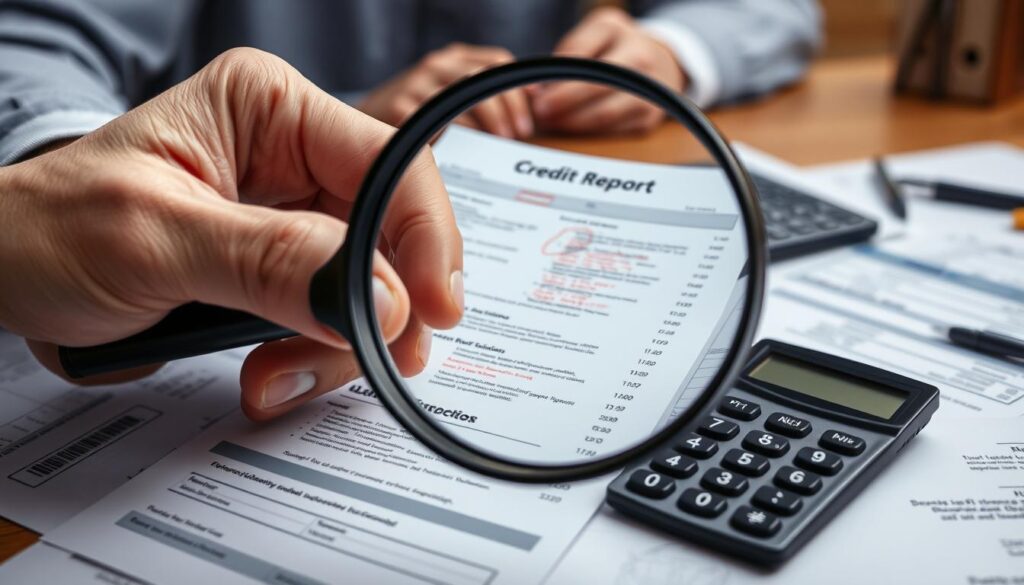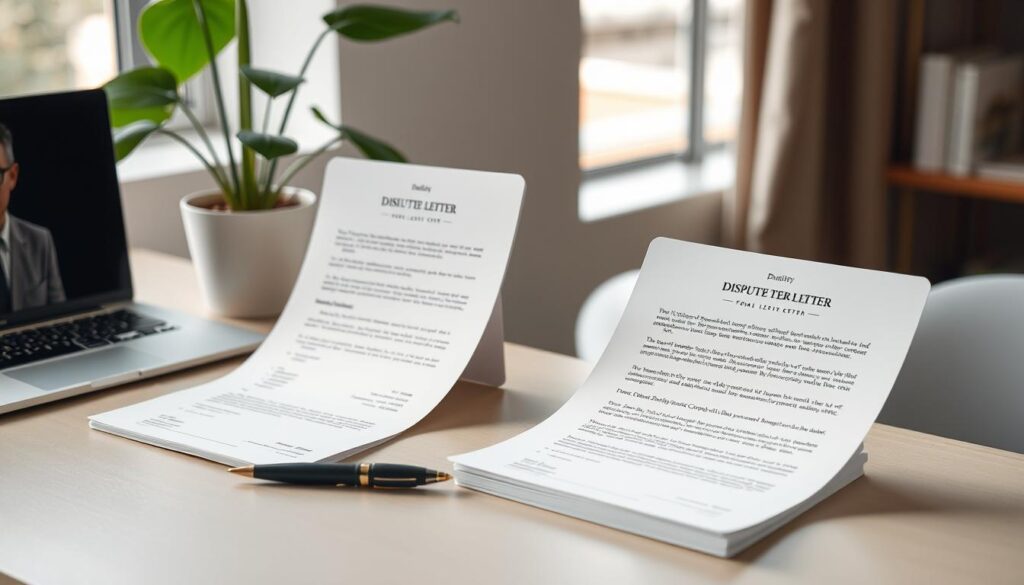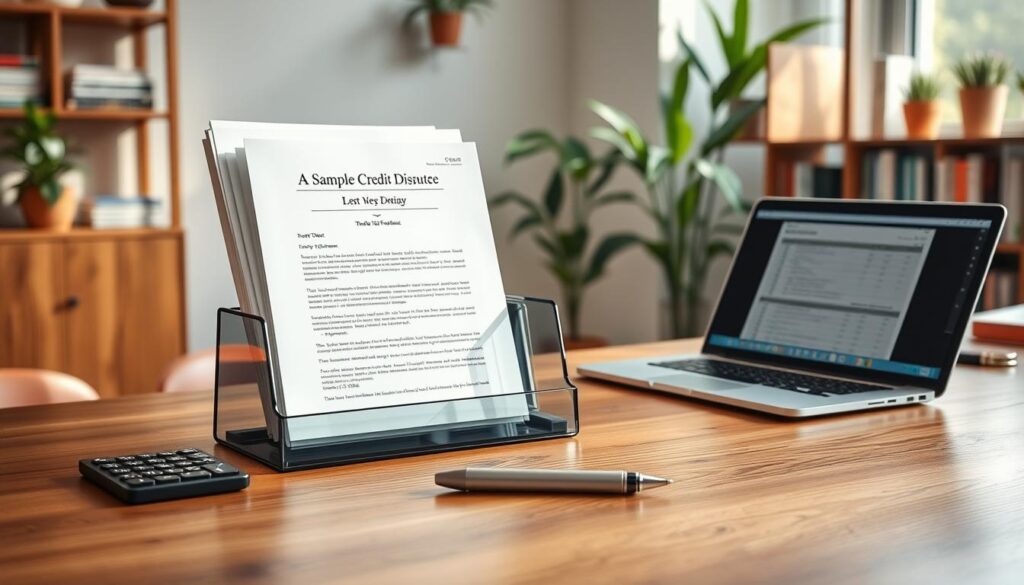A healthy credit profile is vital in today’s financial world. Errors on your credit report can hurt your creditworthiness. Credit dispute letter templates can help you address these issues effectively.
This article offers tools to navigate the credit dispute process. You’ll learn to write persuasive letters and understand your legal rights. Sample templates will help you challenge credit report inaccuracies.
Taking control of your credit can lead to better financial outcomes. It’s a powerful way to unlock new opportunities.
Key Takeaways
- Discover the essential components of a credit dispute letter for maximum impact.
- Understand the credit repair dispute process and how to effectively engage with credit bureaus.
- Explore sample credit dispute letter templates to address specific credit report errors.
- Learn strategies to prevent future credit report errors and maintain a healthy credit profile.
- Gain insights on the impact of successful credit disputes on your credit score.
What Are Credit Dispute Letters?
Credit dispute letters are formal requests to credit bureaus. They aim to fix wrong or missing information on your credit report. These letters are key in credit repair, protecting your rights under the Fair Credit Reporting Act (FCRA).
Understanding the Role of Dispute Letters
Credit dispute letters help keep your credit report accurate. They let you address errors that may hurt your credit score. You can use the section 609 credit dispute code to start an official investigation.
Legal Rights and Obligations
The FCRA gives you the right to dispute wrong information on your credit report. Credit bureaus must investigate your dispute and share the results. This process ensures your credit info is fair and accurate.
“Maintaining the accuracy of your credit report is crucial for achieving financial stability and securing favorable terms when applying for loans, credit cards, or even housing.”
Why Dispute Your Credit Report?
Disputing your credit report is vital for financial health. Inaccurate information can cause higher interest rates and employment difficulties. By disputing credit errors, you can improve your credit profile and financial standing.
Incorrect data can hurt your credit score. This makes borrowing money harder. Fixing credit report mistakes helps you control your financial future.
Removing inaccurate credit entries ensures your report reflects true creditworthiness. It can lead to better loan terms and credit opportunities.
“Disputing inaccurate information on your credit report is one of the most effective ways to improve your credit score and protect your financial well-being.”
Accurate credit reports prevent discrimination in employment and housing. Many use these reports to assess reliability. Maintaining a positive credit profile is crucial.
Disputing errors protects your short-term financial well-being. It also has long-lasting positive effects on your credit score. Take action to secure your financial health today.

Preparing to Write a Credit Dispute Letter
Gathering documents is crucial before disputing credit report errors. This step helps craft a compelling credit report dispute letter. It’s essential for the credit repair dispute process and fixing credit report mistakes.
Gathering Necessary Documents
Get your credit report from Experian, Equifax, and TransUnion. Review these reports carefully, noting any discrepancies or inaccuracies.
Collect supporting documents like billing statements and payment records. These can back up your claims during the dispute process.
Identifying Errors and Inaccuracies
- Closely examine your credit report for any erroneous personal information, such as incorrect name, address, or Social Security number.
- Scrutinize your account details, looking for incorrect account balances, payment histories, or credit limits.
- Check for any accounts or negative items that don’t belong to you, which could indicate identity theft or fraud.
- Ensure that any closed or resolved accounts are accurately reflected on your report.
Thorough preparation is key to drafting an effective credit report dispute letter. Careful attention to detail will help you navigate the dispute process successfully.
By identifying specific errors, you’ll be ready to address each issue. This approach increases your chances of fixing credit report mistakes.
| Document | Purpose |
|---|---|
| Credit Reports | Identify errors and inaccuracies |
| Billing Statements | Provide supporting evidence |
| Payment Records | Demonstrate accurate payment history |
| Correspondence with Creditors | Substantiate disputes and resolutions |
dispute templates for credit
Credit disputes can be tricky, but dispute templates can help. These guides assist you in challenging errors on your credit report. They’re valuable tools for fixing inaccuracies in your financial records.
Incorrect account info is a common credit report issue. Dispute templates for credit help address these problems. They provide structure for disputing errors like wrong late payments or unfamiliar accounts.
Credit dispute sample letters also tackle fraud and identity theft cases. These templates offer step-by-step guidance for swift action. They help protect your finances and prevent credit score damage.
Using these templates can boost your dispute success chances. Customize them to your situation and include supporting documents. This approach helps create a strong case for credit bureaus.

Effective credit disputes require attention to detail and persistence. With the right tools, you can confidently manage the process. Take control of your financial future through informed credit dispute actions.
Essential Components of a Credit Dispute Letter
A good credit dispute letter needs key details. Include these components to make your letter effective and actionable.
Personal and Account Information
Begin with your full name and current address. Add relevant account numbers for disputed items. This helps credit bureaus quickly identify your case.
It also helps them locate the specific accounts in question. Clear identification speeds up the process.
Clear and Concise Language
Use plain language when describing errors in your credit report dispute letters. Avoid emotional claims. Focus on factual evidence that supports your credit dispute sample letters.
This approach presents your case professionally. It makes your argument more compelling to credit bureaus.
Providing clear info helps credit bureaus investigate and resolve issues. Including these components increases your chances of success with credit report dispute letters.
| Key Components | Importance |
|---|---|
| Personal and Account Information | Helps credit bureaus quickly identify your case and the specific accounts in question. |
| Clear and Concise Language | Presents your case in a professional, compelling manner by focusing on factual evidence. |
Sample Credit Dispute Letter Templates
A well-crafted credit dispute letter can be crucial for restoring your credit. We’ve created two templates to help you dispute inaccuracies and request debt validation.
Template for Disputing Inaccurate Information
This template guides you through disputing errors on your credit report. It helps you outline specific issues and provide supporting documents.
Use this template to take a proactive step towards resolving problems and improving your credit score.
- Identify the inaccurate information: Be specific about the account details, account numbers, or any other erroneous data that needs to be corrected.
- Explain the issue: Provide a clear and concise explanation of why the information is incorrect and how it is impacting your credit.
- Request an investigation: Formally request that the credit bureau investigates the disputed items and provides you with a written response.
- Include supporting documents: Gather any relevant documents, such as payment records or identity verification, to substantiate your claims.
- Demand timely resolution: Emphasize your expectation for a prompt and thorough investigation, as well as the timely correction of any verified errors.
Template for Requesting Debt Validation
Use this template if you’re unsure about a debt on your credit report. It helps you request validation from the credit bureau and creditor.
By exercising your legal rights, you can ensure the debt is valid and accurately reported.
- Identify the disputed debt: Provide the specific details of the debt, including the account number, creditor name, and the amount owed.
- Request debt validation: Formally request that the credit bureau and the creditor provide proof that the debt is valid and owed by you.
- Outline your rights: Remind the credit bureau and the creditor of your rights under the Fair Credit Reporting Act (FCRA) and the Fair Debt Collection Practices Act (FDCPA).
- Demand a timely response: Set a reasonable timeframe for the credit bureau and the creditor to provide the requested validation documentation.
- Emphasize the consequences: Clearly state that failure to provide the requested validation will result in the disputed item being removed from your credit report.
These templates are just a starting point. Tailor the content to your specific situation. Ensure your letters are clear, concise, and compelling.
By being proactive, you can effectively navigate the credit dispute process. This approach can help improve the accuracy of your credit report.

Credit Repair Dispute Process
The credit repair dispute process tackles errors on your credit report. It involves submitting a dispute letter, monitoring the investigation, and reviewing results. Understanding this process helps you improve your credit profile effectively.
To start, draft a clear dispute letter about specific errors. Include relevant documentation to support your claims. Submit this letter to the credit bureaus.
Next, track the progress of the investigation. Credit bureaus must investigate within a set timeframe. Stay alert during this period.
- Submitting the Dispute Letter: Draft a clear, concise credit dispute letter. Outline specific errors on your credit report. Include relevant documentation to support your claims.
- Monitoring the Investigation: Credit bureaus must investigate claims within a set timeframe. Stay vigilant and track the investigation’s progress carefully.
- Reviewing the Results: The credit bureaus will provide their findings. Successful disputes lead to corrections or removals. Unsuccessful disputes may require additional steps.
- Persistence and Follow-Up: If initial results are unsatisfactory, continue the credit repair dispute process. Follow up with credit bureaus and provide more evidence to support your claims.
Engaging in the credit repair dispute process helps you control your credit profile. It’s a step towards a healthier financial future.
“Persistence and attention to detail are key when navigating the credit repair dispute process. Your credit report is a reflection of your financial history, and it’s essential to ensure its accuracy.”
Strategies for Effective Credit Disputes
Credit disputes can be tricky. The right approach can boost your success chances. Let’s explore two key strategies: follow-up and professional help.
Following Up and Persistence
Consistent follow-up is vital when disputing credit report errors. Check in regularly with credit bureaus about your dispute’s progress. It may take several rounds of talks to fix the issue.
Seeking Professional Assistance
Feeling swamped by the credit repair dispute process? A credit repair expert can be a huge help. They know the ins and outs of credit reporting and disputes.
These pros can guide you through each step. Their expertise can boost your chances of success. With their help, you can tackle credit disputes with confidence.
| Strategy | Benefits |
|---|---|
| Following Up and Persistence | Ensures your dispute is addressed, increases chances of resolution |
| Seeking Professional Assistance | Leverages expertise in credit reporting and dispute procedures, improves outcomes |
“Persistence and attention to detail are key when disputing credit report errors. Don’t give up – the effort is worth it to maintain a healthy credit profile.”
Handling Credit Bureau Responses
After sending your credit bureau dispute letter, be ready for their response. Learn to interpret findings, understand your rights, and plan next steps. We’ll explore strategies for escalating disputes and engaging with bureaus further.
Review the bureau’s response carefully to grasp their decision and your options. If they’ve made changes, verify the corrections are accurate. You can request investigation results if no changes were made.
You have the right to ask for the data furnisher’s contact information. This allows you to follow up directly with them.
- If the bureau has decided not to make any changes, you have the right to request a copy of the investigation results and any information the bureau relied upon to make its decision.
- You can also request that the bureau provide you with the contact information for the data furnisher (the entity that provided the disputed information) so that you can follow up directly with them.
Unsatisfied with the outcome? Consider escalating the process. File a complaint with the CFPB or FTC. You might also consider legal action against the bureau or data furnisher.
“Persistence and diligence are key when it comes to credit bureau dispute strategies. Don’t be afraid to follow up and keep pushing until the issue is resolved to your satisfaction.”
You deserve a fair and accurate credit report. Credit bureaus must investigate your disputes thoroughly. Know your rights and use effective credit bureau dispute strategies to correct any errors.
Preventing Future Credit Report Errors
Keeping your credit report healthy is crucial. Fixing mistakes is important, but preventing them is key. Regular monitoring helps catch issues early, protecting your creditworthiness.
Monitoring Your Credit Report Regularly
Check your credit report at least once a year. This helps you fix credit report mistakes and remove inaccurate credit entries quickly.
Here are some tips to stay on top of your credit report:
- Sign up for a credit monitoring service to receive alerts about any changes to your report.
- Regularly check your credit report from each of the three major credit bureaus (Experian, Equifax, and TransUnion).
- Carefully review your report for any errors, such as incorrect personal information, duplicate accounts, or accounts that don’t belong to you.
- Dispute any errors or inaccuracies you find with the credit bureaus and the companies that provided the information.
Stay alert and take action to monitor your credit report. This protects your credit score and helps avoid future credit report mistakes.

| Service | Highlights | Cost |
|---|---|---|
| Credit Karma | Free credit reports and scores, credit monitoring | Free |
| Experian | Credit report, FICO score, credit monitoring, identity theft protection | $19.99/month |
| IdentityIQ | Credit report, FICO score, credit monitoring, identity theft insurance | $9.99/month |
The Impact of Credit Disputes on Your Score
Successful credit disputes can boost your credit score significantly. Fixing errors on your report can lead to better loan and credit card terms. This makes it easier to qualify for various financial products.
Removing credit errors can improve your score noticeably. Credit scoring models heavily weigh the accuracy of your credit file information. Fixing credit report mistakes shows lenders you’re a responsible borrower.
The score improvement depends on the error’s severity and impact. Resolving a single dispute credit errors can increase your score by 20 points or more. More serious errors may result in bigger improvements.
| Credit Score Before Dispute | Credit Score After Successful Dispute | Increase in Credit Score |
|---|---|---|
| 680 | 710 | 30 points |
| 725 | 750 | 25 points |
| 640 | 670 | 30 points |
The impact of credit disputes varies based on your credit history. It also depends on the nature of the errors addressed. However, the potential for score improvements is significant.
Taking time to dispute credit errors ensures your credit report’s accuracy. This can lead to better financial opportunities in the future.
“Addressing inaccuracies on your credit report can be a powerful way to boost your credit score and open the door to better financial opportunities.”
Conclusion
You’ve learned key strategies for using credit report dispute letters to challenge inaccuracies. These tools help you reclaim control over your financial standing. Understanding the credit repair dispute process empowers you to craft persuasive credit dispute sample letters.
Disputing credit errors is crucial for maintaining a healthy credit profile. With persistence, you can ensure your report reflects your true financial history. Professional help may be beneficial in navigating complex cases.
Financial empowerment is an ongoing journey. Regularly monitoring your credit report helps catch future errors early. Stay vigilant to maintain the accuracy of your credit information.
By using these strategies, you can take charge of your credit. This paves the way for a more secure financial future. Remember, your credit health is in your hands.

